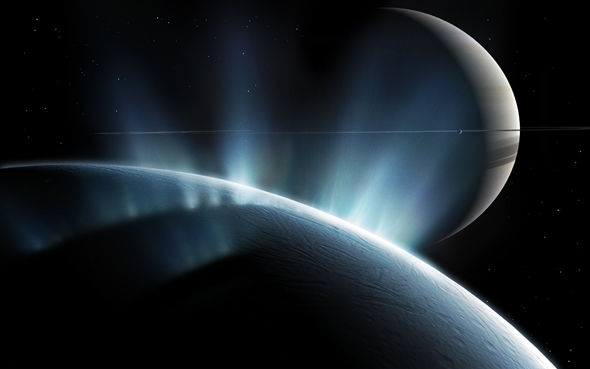
Scientists created a model for Saturn’s moon Enceladus that may explain why its subsurface ocean has yet to freeze solid.
Nasa’s Cassini spacecraft spotted hydrothermal spray coming from one of Saturn’s moons, Enceladus, in 2005, virtually confirming there were large oceans beneath the icy surface.
Astrobiologist Gaël Choblet, from the University of Nantes in France, said: “Where Enceladus gets the sustained power to remain active has always been a bit of a mystery.
“But we’ve now considered in greater detail how the structure and composition of the moon’s rocky core could play a key role in generating the necessary energy.”
It is believed the icy shell surrounding Enceladus has an average thickness of 25 kilometres, but it is as thin as just one kilometre on the south pole of the moon, where the icy plumes were found.
The Cassini probe detected tiny fragments of minerals from the plume which suggested there was salt and silica dust in the spray which were formed through 90 degree celsius water interacting with rock at Enceladus’s core.
For this interaction to occur, there would have to be water in the core of the moon.
Choblet told New Scientist: “Whatever the core’s composition in terms of rocks, it has to have water within it … maybe 20 or 30 percent water.”
The sheer heat and energy created by this interaction would force the warm water upwards rapidly, where it is expelled in the icy plumes.
Research has found the water and rock interaction could be down to radioactive decay of the rocks in the moon’s core.
If so, the heat may have been ongoing for millions of years, which may have allowed life to blossom beneath the surface of Enceladus.
Planetary scientist Monica Grady from the Open University wrote for The Conversation: “A warm global ocean with a lifetime of several billion years would be a great place for life to get going – it only took about 640 million years for life to evolve from microbe to mammal on Earth.
“Unfortunately, though, Enceladus itself may be quite young: a recent paper proposed that the moon might only have formed about 100 million years ago – is that a sufficiently long interval for life to have got going?”













